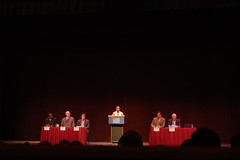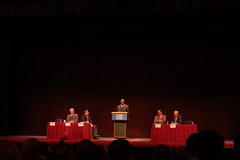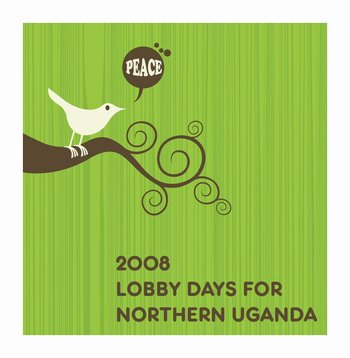Uganda Lobby Day Keynote
As I mentioned in my last post, on Monday morning I went to the keynote panel of Uganda Lobby Day, organised by Resolve Uganda. The keynote was addressing the question, ‘How can the United States and the International Community Most Effectively Contribute to Lasting Peace in Northern Uganda?’ There were some very distinguished panelists…
Gerald LeMelle, Executive Director, Africa Action;
Timothy Shortley, Special Adviser for Conflict Resolution to Assistant Secretary of State for African Affairs Jendayi Frazer (who was on the phone from Juba, Southern Sudan, where the peace talks are taking place);
Jim Knight, Director for East Africa, U.S. State Department;
Ambassador E. Michael Southwick, former Ambassador to Uganda;
Michael Otim, Director, Gulu NGO Forum; and moderated by
Michael Poffenberger, Executive Director, Resolve Uganda.
There was a suprise guest before the panel began as well, Grace Akallo of Zion Project. You can read a bit about her here, her story is powerful.
Some points that stood out from the initial speeches…
- When asking what our role is, it’s important to recognise what we have already achieved, so as to build confidence in what we can still do. (MP)
- The Sharon statement states that the US should only do things that are in it’s own interests – So where is the debate on what the US interests are? (GLM)
- Every foreign policy issue fights for “shelf-space”, and wont be noticed unless it occupies a significant space or there is public clamor to do something. (AMS)
- Don’t settle for a B-effort for an A-cause. Don’t confuse rhetoric with results. (AMS)
[Michael Otim]
After the individual speeches, there was an open Q&A time, which raised some very interesting questions…
- Regarding the role of the ICC (Positive/Negative?): The pressure for accountability [due to arrest warrants issued by the ICC for the top 5 LRA leaders] is partially what caused the LRA to enter peace talks. However, national trials are also very important in giving ownership of the process to Ugandan citizens. (MO)
- Regarding military intervention: Would only complicate things, should exhaust every other option first. However there is a “Responsibility to Protect” doctrine, which grew out of the Rwandan genocide. (AMS)
- Amnesty vs Accountability: Is forgiveness a good option, which then allows combatants to come out of the bush and reintegrate into the community? Forgiveness happens in Africa, unlike in most of the western world. We also need to take into account the complexities of the conflict – a lot of child soldiers where abducted unwilling. (MO) We should not allow issues to carry on longer than necessary, but allow African forms of justice to deal with the combatants. (AMS)
This last point was the main one I’ve been struck by and am thinking through. I’ll let you know if I have any further developed thoughts on this!





Recent Comments